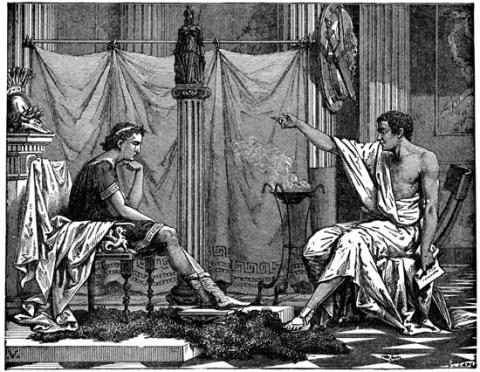The man who made Alexander great

Annabel Lyon has managed to write an historical fiction that rings true in modern times. By Clare Lanigan.
Writers of historical fiction face a unique dilemma – that of language. When writing from the point of view of ancient cultures speaking in forgotten tongues, how do you make the dialogue sound 'right' – in keeping with the time and culture, yet not groaning with pseudo-Shakespearian archaisms? Some, like Mary Renault, succeed; some, like too many Hollywood scriptwriters to name, resort to an unbearable Lord of the Rings-style portentousness that ends up sounding all the more fake for its efforts at authenticity.
In the case of a language no longer spoken, it helps to be familiar with the original tongue to recreate its tone accurately. However, this need not always be essential, as Canadian author Annabel Lyon has shown in her enviably polished first novel, The Golden Mean, which tells the story of the rise of Alexander from the point of view of his tutor, the philosopher Aristotle. Judging by her afterword, Lyon relied on translations for her primary research sources, yet the atmosphere of third-century Macedonia is as convincingly evoked as it probably can be from a 21st-century perspective.
The story, boldly told from Aristotle's point of view, follows the philosopher's installation at Alexander's father Philip's court at Pella and his encounters with the mercurial, intelligent young prince. It flashes back in time to Aristotle's childhood and his career studying in Athens under Plato. Other famous figures appear, including Callisthenes, Aristotle's young relative and later official biographer to Alexander, Olympias, Alexander's mother (thankfully not entwined in snakes and speaking in a bizarre accent à la Angelina Jolie) and a brief and rather understated appearance by Plato himself. The historical events are almost completely adhered to, bar a few edits for narrative propulsion, but where Lyon lets her imagination loose is in examining the inner life of Aristotle. A deeply complex, troubled character emerges, who describes mood swings that the modern reader can easily identify as bipolar disorder. It's to Lyon's credit, however, that Aristotle is not post-modernised, and describes his mental state in a way thoroughly in keeping with the mores of a man of his time. She does a good job of revealing how a contemplative, sceptical man like Aristotle would have felt living in this atmosphere of warlike supersition, yet doesn't temper the preconceptions about female and slave inferiority that a man of his time would have had. Alexander too is sensitively drawn, a fragile yet cruel boy whose mysteriousness is compelling to both Aristotle and the reader. Hints of his future megalomania are subtly dropped, but he is not portrayed as some cartoon dictator-in-waiting.
Lyon has free rein with the female characters such as Olympias and Aristotle's wife Pythias, since much less is known about them than their male counterparts, but wisely avoids imbuing them with anything resembling modern sensibilities. This is a story dominated by men and their relationships with each other – between Aristotle and Alexander, between Alexander and his father and the handicapped brother they keep hidden away, between Aristotle and his (fictional) tutor Illeaus, later with Plato, and most significantly, with his own father, a remote, intellectual medic. Philip's conquest of the Greek peninsula forms the backdrop of most of the story, paving the way for Alexander's frenzied attempt to take the whole world.
Lyon keeps physical descriptions to a minimum, avoiding the bog of detail that writers of historical fiction keep striving not to drown in. Despite the sparse prose, the feel of Pella's court, taverns, homes and kitchens is strongly evoked. This authenticity rarely flags, except when Lyon attempts to thread the development of Aristotle's philosophy of balance between extremes – the 'golden mean' of the title - through the narrative, showing that psychology, not philosophy, is her strong point as a writer. Occasionally Aristotle turns an anachronistic phrase, and sometimes the characters seem a little too psychologically astute than would be plausible, but overall the novel succeeds wonderfully in evoking a time and place while still telling a compelling story.
The Golden Mean by Annabel Lyon
Atlantic Books
£14.99
